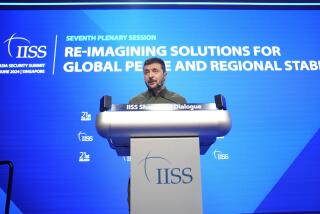PREVIEW / SINO-SOVIET SUMMIT : Moscow Seeks Chinese Goods, Help in an Asian Grand Design
- Share via
MOSCOW — Sometime before dawn Monday, a Moscow boulevard will blossom in a spectacle that would once have made Soviets’ blood run cold. Dozens of Chinese flags will not herald an invading army but greet visiting VIPs as limousines whisk them from their airplane to the Kremlin.
Premier Li Peng’s visit will be the highest contact in Chinese-Soviet relations since Mikhail S. Gorbachev’s groundbreaking visit to Beijing last May, and it gives the Soviets a welcome opportunity to congratulate themselves on one foreign policy initiative that so far has yielded only good fruit.
“I view the normalization of Sino-Soviet relations as a tremendous achievement,” Foreign Minister Eduard A. Shevardnadze said recently. “As you know, the visit by Mikhail Gorbachev was instrumental in it. Now we are translating the agreement into practical deeds.”
With what once was dubbed the “socialist camp” in shambles as the Warsaw Pact allies spin out of Moscow’s orbit, the nearly year-old improvement in ties with Beijing now must seem one of the few diplomatic givens the Gorbachev leadership can count on. In a classic example of realpolitik, the Communist giants who were at odds for 30 years, in large part over ideology, are now willing to cast aside disputes over what true socialism is and deal for what they want.
Relief for Consumers
What the Soviets are seeking from the first visit by a Chinese premier since 1964 is an agreement for increased trade to supply shortage-plagued consumer markets, a rising source of popular discontent and perhaps the prime weakness of the Gorbachev leadership.
Also in part for economic reasons, the Soviets want a further warming in relations so tens of thousands of young men now in army units along the Chinese border can be pulled back and put to productive work in the civilian economy.
“Confrontation has cost both countries dearly,” Shevardnadze said in his published remarks. He called for an end to “military opposition” between them and predicted that the topic would play a major role in the talks between Li, his protocol host Nikolai I. Ryzhkov, who is the Soviet prime minister, and Gorbachev.
The Soviets, however, have been thinking for years in continent-wide terms and would like to sign up the Chinese for their Asian grand design, a multi-nation conference like the Helsinki process in Europe that would work for better relations and simultaneously give the Soviets an institutionalized role in a region where they now feel frozen out.
“I would like to hope that the talks with Li Peng will push our policy in the Asian and Pacific regions ahead,” influential commentator Alexander Bovin of the government newspaper Izvestia wrote recently.
Implying that the Soviets would also try to broaden their campaign to prevent a unified Germany from joining the North Atlantic Treaty Organization, Bovin said the Chinese should be encouraged to play a greater role in solving European problems, including “the unification of Germany.”
Demilitarization Steps
The Chinese have shown no sign of yielding to such blandishments, but Moscow-based Asian diplomats say they are likely during Li’s visit to sign an agreement on “Guiding Principles of Arms Reduction and Trust-Building” that will lay down procedures for demilitarizing the Chinese-Soviet border.
Foreign chancelleries in Moscow have also been told that Li’s visit will lead to an agreement fixing guidelines for Soviet-Chinese economic, scientific and technical cooperation until the year 2000. For whatever the Soviets privately think about the regime that carried out last year’s Beijing massacre, many respect its successes in the economic realm.
“We cannot ignore the Chinese experience in managing the economy,” Shevardnadze has said. “Cooperation can open unlimited possibilities here.”
WHAT THEY WANT Beijing’s Goals Reaffirmation of normalized ties with Moscow. Troop reductions along the Sino-Soviet border. New impetus for trade and economic links. Moscow’s Goals More economic cooperation and trade. An end to military ‘confrontation,’ allowing further border demilitarization. Chinese support for policies on a unified Germany and a diplomatic mechanism to foster Asian trust and security.
More to Read
Sign up for Essential California
The most important California stories and recommendations in your inbox every morning.
You may occasionally receive promotional content from the Los Angeles Times.













